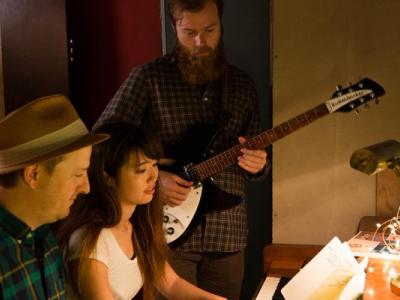What does a Top-Line Songwriter do?
With the invention and proliferation of synthesizers and music production software, music producers and songwriters gained the power to create fully produced songs and recordings without ever hiring a musician. These so-called songwriter-producers went on to rule the mainstream music industry—meaning commercial genres like pop, rap, and EDM—with their expertly (and cheaply) produced instrumental compositions. However, there remained one element they struggled to fabricate: vocals, the so-called "top line" of a musical track. Emerging to fill this void, top-line songwriters began to work closely with producers, creating compelling melodies, harmonies, and lyrics to sit atop their instrumental tracks. Today, most mainstream hits by top recording artists are the product of collaboration between a songwriter-producer and a top-line songwriter.
In order to succeed in this field, one needs an excellent singing voice, masterful lyric and melody-writing ability, the ability to improvise, good business sense, and an attentive grasp on the current musical landscape.
Toplining is an idiosyncratic process, at times requiring a methodical, compositional approach and at others an experimental, improvisational one. When working on a track, top-line songwriters frequently start by coming up with several core vocal melodies—"hooks"—and words or phrases that seem to match the tone of the track (or the producer's requested topic). Over time and through much trial and error, these ideas are refined into developed sections like verse and chorus. When the song is just about finished, the topliner records the lead and background vocals, creating a vocal demo that acts both as a tool for selling the song to recording artists and their managers, and as a blueprint for the eventual singer.
At a Glance
Most top-line songwriters get their introduction to the industry as performing songwriters, staff writers, session vocalists, or even recording artists. The line between artist and writer is often porous, and many continue to advance artist careers alongside their work as a top-line songwriter. Talented and driven top-line songwriters can become major industry players, receiving a steady flow of work and contributing to chart-topping hits. Additionally, many top-line songwriters become successful recording artists in their own right.
Aspiring top-line songwriters should set up shop in a music-industry-heavy city like New York City, Los Angeles, Atlanta, or Nashville. Recording vocal demos for other artists, doing live and studio gigs as a backup singer, and participating in group writing sessions are all great ways to begin cultivating connections with professionals like studio managers, music producers, recording artists, managers, and music publishers—all of whom could help one catch a career break. Considerable networking might be required to find one's first gigs as a topliner.
Lesser known remixers and songwriter-producers might also look for remote collaborators online, opportunities which can be excellent for beginning topliners looking to build their résumé. In absence of early gigs like these, one could use free online backing tracks to practice toplining and create a demo reel. One top-line songwriter even recommends using a single track to create multiple distinct top lines, demonstrating creative flexibility.
- Vocal performance
- Melody writing
- Lyric writing
- Vocal production
- Basic audio production and recording
- Music publishing rights
Perhaps the most important quality for a top-line songwriter is the ability to collaborate. Songs are rarely perfect on the first try, which is why the best top-line songwriters know how to effectively self-critique and incorporate feedback from others. That aside, in order to succeed in this field, one needs an excellent singing voice, the ability to create distinctive and expressive lyrics and melodies, improvisatory skills, good business sense, and an attentive grasp on the current musical landscape. Ester Dean, who has written songs for industry giants like Rihanna and Nicki Minaj, says that “long-term success in this business comes from being able to change with the times….songwriters need to understand that music is always changing.”
Generally speaking, there are two kinds of gigs for top-line songwriters: studio gigs, where the top-line songwriters works in person with the tracks' producer(s); and remote gigs, where the topliner receives a track over email and fires back stems of their own vocal recording, usually created in a home or private studio. In-person studio sessions might last anywhere from a couple of days to a week, during which time the top-liner generally works on a large number of tracks. On the other hand, remote gigs usually have a very quick turnaround, mainly due to the fact that producers often send the same track out to multiple top-liners who compete for the songwriting credit. For this reason, songwriters who prefer to work from home must be ready to work at any time in order to get an edge on the competition.









